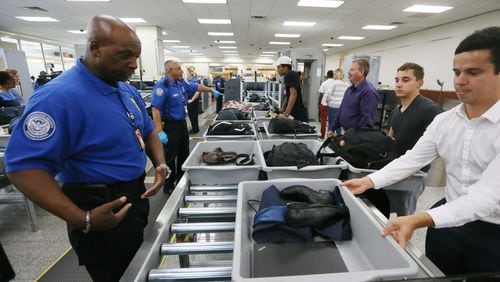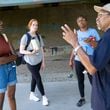The next time you fly, you may need to take your iPad, tablet or other large device out of your bag and put it into a separate bin, under a new airport security screening rule announced Wednesday.
In coming weeks and months, the Transportation Security Administration said it will roll out "new, stronger screening procedures for carry-on items that require travelers to place all electronics larger than a cell phone in bins for X-ray screening in standard lanes" across the country.
The large electronic devices must be placed in a bin with nothing on top or below, similar to laptops, according to TSA. That allows officers to see a clearer X-ray image.
The increased security measures come amid a potential threat from explosives that can be hidden inside electronics. During training of TSA officers from across the country at a federal facility in Brunswick, GA, the trainees are taught that some explosives are as thin as a sheet and can be disguised as a letter in an envelope. They can be liquid or solid, granules, powder or have the texture of cake frosting.
There are no changes to what travelers can bring through the checkpoint, just a change in what has to be removed from bags to be screened separately.
And, the new requirement on large electronics does not apply to those enrolled in TSA PreCheck, which costs $85 for a five-year membership, who are in PreCheck lanes.
The agency has been testing the new rule on large electronics at ten airports, including in Boise, Colorado Springs, Detroit, Fort Lauderdale, Boston, Los Angeles, Lubbock, San Juan, Las Vegas and Phoenix.
Now, TSA plans to expand the stricter screening requirement to all U.S. airports "during the weeks and months ahead."
"By separating personal electronic items such as laptops, tablets, e-readers and handheld game consoles for screening, TSA officers can more closely focus on resolving alarms and stopping threats," said TSA acting administrator Huban Gowadia in a written statement.
"It is possible that passengers may experience more bag checks," according to the agency. TSA officers will help guide passengers through the screening process, the agency said.
-- Stay up to date on the latest news on Atlanta airline travel by following Atlanta Airport News Now on Facebook --
MORE:
Georgia hosts TSA officer boot camp
PreCheck an option to tackle long security lines
Survey: Biggest frustration with airport security measures is shoe removal rule
Hartsfield-Jackson completes 22 smart lanes at TSA checkpoints Large electronic devices must be placed in a bin with nothing on top or below, similar to laptops, according to TSA. That allows officers to see a clearer X-ray image.
About the Author







